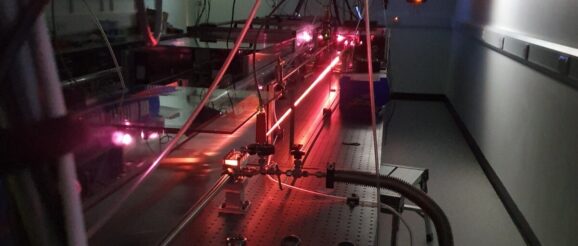Heriot-Watt partnership to drive innovation in laser technologies

A new partnership between Heriot-Watt researchers and a major international supplier to the semiconductor industry could drive the advancement of new light source technologies.
The five-year collaboration with ASML will see research pioneered by Heriot-Watt’s Professor John Travers help create a direct route from lab to market for new laser technologies.
Heriot-Watt University said the partnership demonstrates its expertise in attracting industry collaborations and overseas investment into some of its cutting-edge academic research.
Based in the Netherlands, ASML is one of the world’s leading manufacturers of semiconductor lithography machines.
The company uses light to print tiny patterns onto silicon, resulting in the mass production of semiconductor chips. Precision is key to the printing technique.
Optical metrology also uses light to establish the exact measurements required. Developments in this field allow top chipmakers to create better performing, cheaper chips.
Semiconductor lithography machines are worth millions at a time, and as such, ASML said it is vital to explore new ways to streamline processes.
Hein Otto Folkerts, vice-president within Development and Engineering at ASML, said: “ASML has a long tradition of close partnerships with academia. Our collaboration with Professor Travers and Heriot-Watt University will complement ASML’s research agenda, supporting our technology roadmap.
“This group at Heriot-Watt is one of the leading groups in the world working on these kind of light sources and has a track record on innovations.”
David Richardson, Chief Entrepreneurial Executive at Heriot-Watt University, added: “The work of Professor Travers and his team is hugely important to the advancement of light source and sensor technology.
“Through collaborations of this type, Heriot-Watt University can create greater cohesion between academic disciplines, industry partners and the global community.”
The partnership has led to the creation of a new lab at Heriot-Watt that will accelerate the industrialisation of fundamental physics research.
Professor Travers’ current focus is on new broad bandwidth light sources for optical metrology. The sensors in ASML’s machines must work at multiple wavelengths because they encounter various materials, each of which absorb in different ways.
Commenting on the team’s research, Professor Travers said: “The type of optical components used in recent research previously sat in the domain of fundamental physics research.
“Working in close cooperation with ASML is rapidly moving our work in the direction of the industrialisation of this technology, where we are addressing specific engineering challenges, and applying the technique to create real-world impact.”
He added: “My research into fundamental physics can be used by ASML in an industry setting. So often in academia, the focus is on advancing the science and impressing our peers. However, through this industrial partnership, we are addressing specific real-world engineering challenges, with industry and academia learning from each other.”
Advances in light source technologies are not limited to semiconductor chip manufacture, researchers said. There are also valuable uses for the technique in healthcare technology and precision manufacturing.
